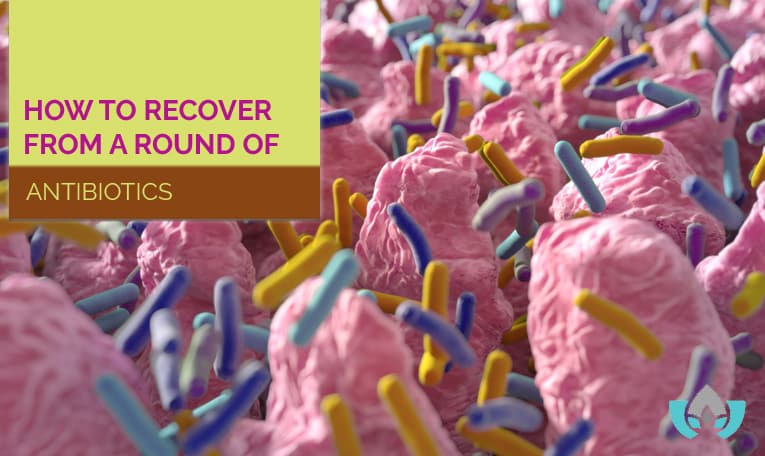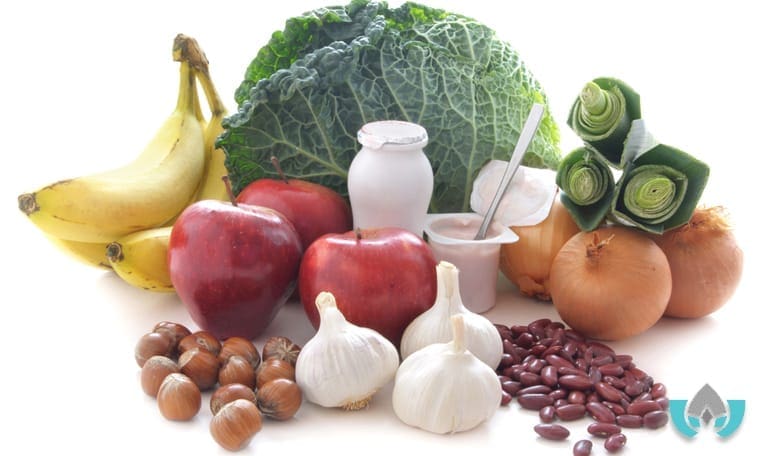
No one likes getting sick, but life can get a bit more difficult when you get a bacterial infection that requires antibiotics.
We have all been there since getting a bacterial infection is quite common; but thankfully, we live in a time when antibiotics are widely available, so it’s very likely that you will recover quite easily.
However, taking antibiotics can be both a blessing and a curse.
While they kill the bacteria that are making you sick, they also kill the good bacteria in your gut.
This may result in an upset stomach, diarrhea and more serious issues that no one wants to deal with after having an infection.
If all this is starting to sound familiar, you might be interested in seeing a naturopath for digestive problems and gut health, so you can get the best advice and treatment plan for your specific situation.
For now, let’s find out more about what you can do to successfully recover after taking antibiotics.
What Is Your Gut Microbiome?
Your gut microbiome is the collection of microorganisms living in your large intestine.
They influence things like digestion of food, mental health, your immune system, and more.
Everybody has a different gut microbiome, since the amount and type of bacteria present can be influenced by a number of factors.
These factors include:
- Gender
- Age
- Geographic location
- Socioeconomic conditions
- Diet and nutritional status
- Autoimmune disorders of the digestive tract like Crohn’s disease and ulcerative colitis
What Are Antibiotics?
Most people here in Canada have been prescribed antibiotics at some point.
But what are they?
This kind of medication is used to treat bacterial infections.
It works by either stopping an infection or keeping it from spreading.
However, there are many kinds of antibiotics and the most commonly used ones are broad spectrum, which means that they work on a wide range of diseasecausing bacteria, while some other kinds are made to kill certain species of bacteria.
Antibiotics are very important and quite effective to treat infections, which has saved many lives.
However, like most medications, antibiotics come with some side effects that can be harmful.
Antibiotics Side Effects
A very common problem these days is the excessive use of antibiotics, which can cause health issuesfrom a simple episode of diarrhea to more serious conditions such as liver damage.
However, the most common side effects from antibiotics are:
- Diarrhea
- Yeast infections
- Gas
- Vomiting
- Nausea
- Constipation
There are also some studies showing that antibiotics can:
- Dramatically change the kinds of bacteria within the gut, especially at an early age.
- Increase the risk of obesity when overused at an early age.
- Lead to antibiotic resistance when used excessively, decreasing effectiveness
Let’s take a closer look at how this works.
1. Gut Microbiome Issues
Let’s talk a bit more about your gut microbiome.
The most common issue when taking antibiotics is the disturbance of your gut microbiome.
As mentioned above, antibiotics end up killing the good bacteria living in your gut along with the bad bacteria making you sick.
In fact, one study shows that just a week of antibiotics can change your gut microbiome for up to a year.
Unfortunately, this can’t really be avoided when taking antibiotics.
When there’s an imbalance of good and bad bacteria in your gut caused by the use of antibiotics, you can expect issues with digestion, inflammation of the gut lining, and even mood changes.
This is concerning because if left unattended it can lead to more serious problems and health conditions.
2. Immune System Issues
The sad irony of antibiotics is that while it can help kill a bacterial infection, it can also weaken your immune system, making you more vulnerable to future infections.
The gut and the immune system work together to keep your body healthy.
So, when your gut microbiome is not well balanced it can weaken your immune system.
3. Other Side Effects
There are a number of other side effects associated with antibiotics as well.
A 2017 study showed that antibiotic use is the most common cause of liver injury.
As well, because antibiotic use can cause a temporarily weakened immune system, it can put you at greater risk of bacterial infections, including:
- E.coli infection
- C.diff infection
- Salmonella infection
However, this can also happen to people with healthy immune systems, so it’s important to take care of your body right after taking a round of antibiotics.
An Important Caveat
Before we continue, it’s important to note that I am not suggesting that you not take antibiotics.
In spite of the side effects, antibiotic use is one of the strongest weapons we have in the fight against potentially deadly infections.
If your doctor recommends you take antibiotics, listen to them.
Don‘t go to your doctor and tell them “well my favourite naturopathic doctor near me said I didn’t have to” – I am absolutely not saying that.
Instead, this article is about how to mitigate the side effects from taking antibiotics.
And with that in mind…
How To Recover From Antibiotics
Antibiotics are still important to get rid of the bacteria making you ill, so taking your medication as directed is a must.
However, doing everything you can to prevent and treat the side effects from it, is also a good idea.
In order to recover from taking antibiotics, it’s important to improve your gut health by supporting your gut microbiome, and this will depend on some dietary changes.
Below, you will find a list and guide that can help you make the changes you need.
1. Take Probiotics
Probiotics are live bacteria and yeasts that are good for your digestive system. They can usually be found in many fermented foods.
However, you can also buy probiotic supplements but make sure to choose the right kind of good bacteria, since these supplements can contain many different kinds.
There are some studies showing that lactobacilli and saccharomyces probiotics are particularly effective to recover after antibiotic use, but these other bacteria are also very helpful:
- L. casei
- L. Rhamnosus GG
- L. Plantarum 299v
- B. subtilis
- B. coagulanslactospore
- B. clausii
It’s recommended to take probiotics after a round of antibiotics in order to restore the healthy bacteria in your gut that might have been killed.
Also, according to some studies it might be better to take a probiotic supplement containing a mixture of different species of probiotics, instead of just one.
The one thing to always remember is that probiotics are usually bacteria themselves, so if you decided to take them at the same time you are taking antibiotics, you’ll likely end up killing them.
Therefore, it’s very important to remember to take probiotics and antibiotics a few hours apart.
Taking probiotics to recover from antibiotics is definitely the first line of action, especially since they can reduce the risk of getting diarrhea when taken during antibiotic treatment and help restore the gut bacteria when taken after antibiotics.
2. Take Prebiotics
Now that we know that probiotics are usually live bacteria that can help restore the balance of your gut microbiome, let’s talk about prebiotics which are basically foods that feed the good bacteria in your gut.
There are many high fibre foods that are prebiotic. When the fiber from food gets digested and fermented by gut bacteria, the good bacteriagrow.
There are also some other foods that work like prebiotics, even though the fiber content is not high, but they still help the growth of good bacteria like bifidobacteria.
A good example of this is red wine and cocoa, which contains antioxidants that are digested by gut bacteria.
However, keep in mind that you can also buy prebiotics supplements at the store.
When you feed the good bacteria by taking prebiotics after a round of antibiotics, you help reduce the unhealthy bacteria in your gut and promote the growth of healthy bacteria.
This is a very helpful step in your journey to recover from antibiotics.
Prebiotic foods include:

3. Eat Foods High In Fibre
Many foods high in fibre are prebiotic and even though your body can’t digest fibre, your gut bacteria can and this help them to grow.
Here are some examples of foods which are high in fibre:
- Nuts
- Seeds
- Lentils
- Berries
- Peas
- Broccoli
- Bananas
- Artichokes
- Beans
- Whole grains, fruits, and vegetables in general
While eating fibre is a good thing for your body, it can also slow down the rate at which the stomach empties and therefore slow down the rate at which medicines are absorbed.
This is why using fibre to help your gut bacteria should be done after taking antibiotics, that way you don’t interfere with your medical treatment.
4. Eat Fermented Foods
Some fermented foods contain probiotics and as mentioned before, probiotics are the first line of action to help your gut microbiome after or while taking antibiotics.
Here are some examples of fermented foods:
- Yogurt
- Cheese
- Sauerkraut
- Kombucha
- Kimchi
These foods contain many healthy bacterial species such as lactobacilli and bifidobacteria which lowers the number of disease-causing bacteria in your gut, such as enterobacteria and bilophilawadsworthia
In fact, studies have shown that people who eat yogurt regularly have higher amounts of lactobacilli in their intestines and therefore less chances of getting sick from harmful bacteria.
Keep in mind that you should eat unsweetened yogurt, best if it is high in protein and percentage of fat.
In summary, something as simple as eating yogurt can reduce the risk of antibiotic associated diarrhea, but if you can consume more of the other fermented foods as well, you would definitely develop a very strong gut microbiome and obtain good overall health.
Eating one of the fermented foods listed above per day is equivalent to taking a probiotic supplement.
Book Your Appointment With The Mindful Healing Clinic Today
Everyone’s gut microbiome is different based on several factors including gender, diet, health conditions, etc.
So, while these may be good general suggestions, it doesn’t account for your unique health needs.
The best way to figure out what works best for your own body is to visit a naturopathic doctor.
A naturopathic doctor can listen to your specific needs and make a dietary plan, to help you overcome any side effects and health conditions you might have developed from taking antibiotics.
Book an appointment today with the Mindful Healing Clinic and ask our team how we can help.
Until next time,
Dr. Maria Cavallazzi, N.D
Mindful Healing Naturopathic Clinic
Mississauga, ON L5M 1L7
(905) 819-8200
► https://g.page/MindfulClinicNaturopathic
Dr. Maria Cavallazzi is a medical doctor from Colombia where she practiced as a family physician for 8 years until she moved to Canada 16 years ago and became a naturopathic doctor in Mississauga.


